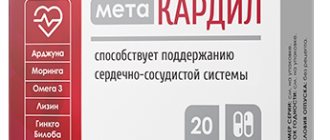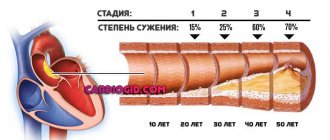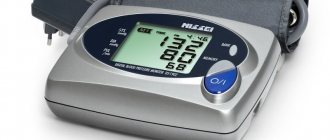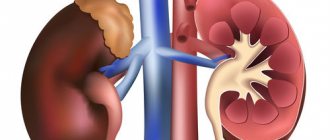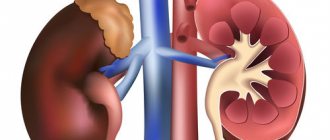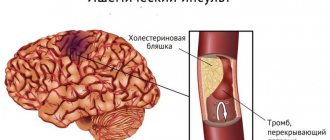Jumps in blood pressure and pulse during excitement
Asus
March 19, 2018
Good afternoon I am turning to you with my big problem. I am a very suspicious, anxious person who worries about everything, with a very unstable emotional background, pressure surges up to 170/110. I feel safe only at home, when I don’t have to go anywhere, the pressure is normal 110-130/65-85. At home I and I don’t remember that I need to try it on, it’s just normal. But as soon as I go somewhere, for example, to the clinic or to the store, to work, to the car, to the dining room, excitement begins and pandemonium with blood pressure begins. With excitement, both blood pressure and pulse instantly jump, jitters begin, and if I’m at home, I I quickly calm down and my blood pressure and pulse drop. And if I’m away from home, it’s because I don’t know what the pressure is. I actually fly away somewhere out of fear. At this moment my heart is pounding wildly and my throat is dry and my throat is dry. And right away I was diagnosed with stage 3 hypertension and prescribed pills to take. Where does this arterial hypertension come from?! As soon as I get home, I take my blood pressure and my blood pressure is normal. Outside the house, where there is no way to measure my blood pressure, I constantly worry about it, whether it is high or not. I need the tonometer to be with me all the time. I can, of course, go to the pharmacy and measure it, but just thinking that I’m about to see 170/110 again makes it fly even higher, and the people around me will be surprised by such numbers and that I still alive and renewed And I just experience a very strong heartbeat and excitement. At home, where I am in a calm environment, the pressure is normal, there are times when it rises to 145/95, but this is due to the lack of fresh air, when I may not leave the house for two days. And also, if I need to go somewhere far by car, by bus, I begin to experience internal discomfort in advance with nagging pain in the chest, which goes away after taking validol. and I definitely need to measure my blood pressure before the trip, and again I see the numbers 152/110, I get very upset and worried. Now that I have to go to work, I’m starting to jitters and worry in advance. That the pressure will be constantly elevated, if not high, and will stay the whole day both the heart and blood vessels will work under load. But I’m simply afraid to try it on at work and see big numbers again. I'm starting to be afraid of the outside world. I’m afraid to measure it with a device, because I’m overthinking myself in advance and predicting a bad result! How can I get rid of this fear? I understand that the doctor will not bite me, but I can’t help myself. There is a click right in the head, a thought flashes through, then a strong tachycardia and a jump. How can I really understand what pressure I'm walking with? And I also began to be afraid to go far from home (on vacation or to another city). I was afraid that my blood pressure would jump, and no one could help. I don’t know how to get out of this circle... Yes, I myself am afraid of these jumps, although I read somewhere that panic attacks do not die. It turns out that I am afraid of literally everything in life: flying on an airplane, driving fast in a car when overtaking, having lunch with people. Constant jitters and anxiety. Thank you in advance for your response.
The question is closed
- What is stress?
- Increased blood pressure in response to stress as an adaptation
- Increased blood pressure due to chronic stress or failure to adapt
- How to correctly assess your blood pressure level during stress?
What is stress?
According to the classical definition, stress in medicine is a nonspecific reaction of the body that occurs as a response to various physical factors and strong emotions (stressors) that threaten to disrupt the stable state of the body, and leads to characteristic changes in the nervous and endocrine systems.
It is widely believed that stress is always bad for a person. But in fact, stress performs the most important protective and adaptive function, it triggers processes that allow you to survive a stressful situation with the least losses and emerge victorious. Only repeated, chronic stress poses a real danger [1].
This difference is clearly visible if we consider the effect of stress on blood pressure as an example.
Increased blood pressure in response to stress as an adaptation
Consider the classic situation where a person needs to publicly present and then discuss a project with colleagues.
The feeling of excitement and emotional tension increases, and the body reacts to this by releasing many hormones. Adrenaline, norepinephrine and cortisol lead to increased heart rate, increased blood pressure, increased blood flow speed, and increased blood glucose levels. Such changes lead to an improvement in the blood supply to the brain, it absorbs an increased amount of glucose and oxygen from the blood, concentration and concentration increases, the reaction speed increases, which means that the person becomes as collected as possible and ready to answer any question [2]. In this case, in a healthy person, the pressure will be within acceptable limits, not higher than 140/90.
After some time, the discussion of the project ends, the stress factor disappears and the body returns to its original state. Within a few hours, the heart rate decreases and blood pressure normalizes [3]. Thus, with the help of stress, the body successfully adapted to the situation and then returned to a stable state (homeostasis).
Such a short-term increase in pressure can only be harmful if a person suffers from hypertension or other chronic diseases.
Increased blood pressure due to chronic stress or failure to adapt
Let’s assume that the same person has a “dark” streak in his life. First, the child got into trouble at school and had to go to the principal, then an icicle fell on the car and broke through the roof, and then the neighbors flooded the apartment. Because of this, he was late for work the next day, receiving a scolding from his superiors. A day later, his previously approved project was canceled due to lack of funding, and he was transferred to remote work due to the pandemic, depriving him of the opportunity to see his beloved colleagues live.
This series of stressful effects did not allow the body to fully recover, which led to a chronic increase in the level of cortisol, corticosterone and mineralcorticoid hormones in the blood, and these hormones, in turn, contributed to the maintenance of high blood pressure for a long time [5, 7]. As a result, adaptation failed, the body began to consider constantly elevated blood pressure as the norm, and baroceptors responsible for regulating pressure and various body systems responsible for homeostasis adapted to this level [4]. A step was taken towards the development of hypertension.
It is these people who often turn to therapists with complaints like “the pressure is jumping from the nerves” or “they constantly have a headache at work.” After all, any additional stress factor will cause a further increase in the already elevated level of blood pressure, leading to the development of unpleasant symptoms and the risk of a hypertensive crisis [9].
How to correctly assess your blood pressure level during stress?
It is best to measure blood pressure using an accurate automatic blood pressure monitor while sitting, after resting for 10-15 minutes.
During a stressful event and 2-4 hours after it, elevated blood pressure readings may be recorded [9]. However, if a person does not experience severe discomfort, and the numbers do not exceed 140-150 units of systolic (“upper”) pressure and 100 units of diastolic (“lower”) pressure, then this condition can be classified as a normal variant during adaptation to stress.
If the pressure remains high for more than 6 hours, symptoms such as headache, dizziness, tinnitus, blurred vision, nausea are observed, it makes sense to call an ambulance or consult a doctor. Also, a reason to consult a doctor may be persistently elevated blood pressure for several days or the appearance of similar symptoms during any emotional experiences [8].
It is best to monitor your condition using an observation diary, briefly describing what exactly led to the increase in pressure, to what level it rose and what the symptoms were. Such a diary will greatly help the specialist to choose and prescribe the correct treatment. It is most convenient to keep such a diary when the tonometer has a memory function and remembers the results of the latest measurements.
1. Bobkov A.I., Reshetnyak D.V., Nikushkin E.V. About compensated and decompensated hormonal and biochemical disorders during clinical stress // Klin. lab. diag. – 2009. – No. 9. – P. 42–43 2. Buijs, R. M., & Van Eden, C. G. (2000). The integration of stress by the hypothalamus, amygdala and prefrontal cortex: balance between the autonomic nervous system and the neuroendocrine system. Cognition, Emotion and 3. Autonomic Responses: The Integrative Role of the Prefrontal Cortex and Limbic Structures, 117–132. 4. Yaribeygi, H., Panahi, Y., Sahraei, H., Johnston, T. P., & Sahebkar, A. (2017). The impact of stress on body function: A review. EXCLI journal, 16, 1057–1072. 5. McEwen BS (2006). Protective and damaging effects of stress mediators: central role of the brain. Dialogues in clinical neuroscience, 8(4), 367–381. 6. Ostroumova, O.D., & Kochetkov, A.I. (2018). Worksite hypertension as a model of stress-induced arterial hypertension. Terapevticheskii arkhiv, 90(9), 123–132. 7. Strizhakov, LA, Babanov, SA, Lebedeva, MV, Moiseev, SV, & Fomin, VV (2018). Arterial hypertension at the workplace: risk factors and the population value. Terapevticheskii arkhiv, 90(9), 138–143. 8. Antonov, E. V., Markel', A. L., & Yakobson, G. S. (2011). Aldosterone and stress-dependent arterial hypertension. Bulletin of experimental biology and medicine, 152(2), 188–191. 9. Akagi, S., Matsubara, H., Nakamura, K., & Ito, H. (2018). Modern treatment to reduce pulmonary arterial pressure in pulmonary arterial hypertension. Journal of cardiology, 72(6), 466–472. 10. Heine, H., & Weiss, M. (1987). Life stress and hypertension. European heart journal, 8 Suppl B, 45–55.
Author
Kasabov K.A.,
Lecturer at the First Moscow State Medical University named after I.M. Sechenov, researcher at the Research Institute of Pharmacology named after. V.V. Zakusova.
blood pressurehuman blood pressure increasedsevere stressreduce pressurestress causeanxiety feelingperson stress
Share this article with your friends
Content:
- 1 Why does pressure increase from nerves?
- 2 How to distinguish hypertension from a temporary increase in pressure?
- 3 How to reduce blood pressure after stress?
- 4 Treatment methods and list of medications 4.1 Diuretics
- 4.2 Beta blockers
- 4.3 Angiotensin inhibitors
- 4.4 Calcium channel blockers
The main one, so to speak, is adrenaline secreted by the adrenal cortex. It can have a significant effect on blood vessels. The hormone causes them to spasm. This effect is enhanced by glucocorticoids. This is why under stress, blood pressure rises, sometimes to critical levels.
Panic attacks and symptoms
Quite often, panic disorder is disguised as other diseases, which makes it difficult to quickly diagnose the disease. Patients experience the same sensations that appear in real neurological, cardiovascular and other serious pathologies.
A person who has recently experienced panic disorder, as a rule, does not know about it, so he often turns to doctors of various specializations for help. The patient is prescribed various examinations of the body, and in the end it turns out that he has no pathologies of internal organs, but despite this, the symptoms of a non-existent disease continue, even intensifying over time. In this case, we can talk about the presence of a panic attack or panic disorder.
Signs of a panic attack
The signs of this disease in most cases have a pronounced physical characteristic; the symptoms are similar to a heart attack, so many patients suspect heart pathology. However, even strong vegetative manifestations in this case are a consequence of dysfunctions of the nervous system and brain.
The main symptoms of a panic attack are anxiety attacks, which are accompanied by autonomic disorders (rapid heartbeat, chills, sweating). With an increase in the level of anxiety, the physiological parameters of the body, which are situational in nature, are often disrupted.
The severity of anxiety varies from a state of internal tension to pronounced panic and fear of death. The average duration of an attack is 15-30 minutes. Anxiety reaches its maximum in the first 5-10 minutes and goes away as suddenly as it started.
Sometimes a panic attack develops against the background of situations that are uncomfortable for a person: being in a crowd or in a confined space.
For some people, attacks occur several times a day, for others - 1-2 times a month. Panic attacks often occur during the daytime. At night, anxiety attacks are more likely to bother strong-willed people who control their feelings while awake.
↑ Traditional medicine methods
In addition to the methods described above, chokeberry is considered a good traditional medicine. The treatment course lasts from 15 to 20 days. It is recommended to take 10 to 15 g of berries daily or drink juice based on them.
Garlic mixed with vodka also helps against nervous hypotension. Take two heads, having previously crushed them. Then mix it with 250 g of alcohol and leave for 12 days. The product should be taken for 3 weeks, 20 drops each. You can add mint to improve the taste.
Motherwort has proven effectiveness. If valerian requires long-term use, then this is not relevant for this plant. It is good to take it as part of modern drugs, for example, Novopassit.
Aromatherapy sessions provide effective relaxation. For nervous hypertension, lavender, ylang-ylang, rose and marjoram oils are used. The use of citrus fruits and bergamot is allowed. Take warm water into the bath and add 3 drops of oil.
↑ How to reduce blood pressure after stress?
If the increase in blood pressure due to stress happened once, taking blood pressure pills, for example, beta-blockers, is not recommended. They can only be prescribed by a doctor. Experts recommend treatment with medications if the disease is at stage 1 or 2 of development.
If there is an increase in blood pressure due to stress, it is advisable to take sedatives of natural origin. These products contain the herbs motherwort, lemon balm and valerian root. You can brew the herbs yourself and drink them instead of tea.
↑ Why does pressure increase from nerves?
According to statistics, 70% of people, at one stage or another in their lives, complain of high blood pressure from chronic stress. Sometimes emotional shocks lead to a hypertensive crisis. During this phenomenon, there is a powerful release of adrenaline into the blood. The manifestation of a hypertensive reaction is redness of the face, a feeling of pulsation in the temples.
There are people who are prone to increased blood pressure under stress. Accordingly, any, even minor, experiences can provoke hypertension. In such cases, they speak of hereditary weakness of the vascular walls. At the same time, vegetative-vascular dystonia is diagnosed. It disrupts the balance in the functioning of all organs and systems. Such disorders can be triggered by chronic stress.
VSD is divided into several types:
- according to the hypertensive type;
- hypotonic type;
- according to the mixed type.
If a person leads a sedentary lifestyle, he is highly likely to develop hypotonic dystonia.
Why are pressure and stress so closely linked? Initially, man was forced to exist in the wild, where he was in danger at every step. Accordingly, the adrenaline that was released throughout the day found an opportunity for disposal, so to speak. People had to hunt wild animals to get food. Sometimes they were forced to defend themselves from their own kind or from wild animals. The constant struggle for survival did not allow excess energy to accumulate. Today there is no need for this. People live in conditions of excessive comfort.
{banner_banner1}
Now a person has everything he needs for a normal existence. He wakes up and falls asleep in a cozy apartment. At work, an office awaits him, where no one bothers him, and he leisurely goes about his work. There is no need to get food either. You can buy it in the store. The natural mechanisms inherent in the body fail precisely because the lifestyle of modern people contradicts the way we were all originally designed.
At the same time, we often have to deal with the hypertensive form of the disorder. Why does stress increase blood pressure? Severe emotional shock causes sleep problems, constant feelings of anxiety and fear. Patients get tired very quickly, they are unable to concentrate and focus their attention on one thing. The mixed form of dystonia, according to experts, is formed on the basis of internal conflict. The parasympathetic nervous system is responsible for rest. She comes into conflict with the sympathetic. The latter regulates emotional factors, as well as sleep and rest patterns.
